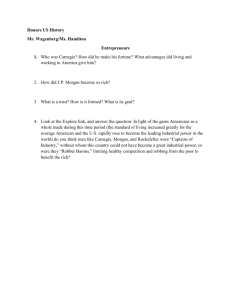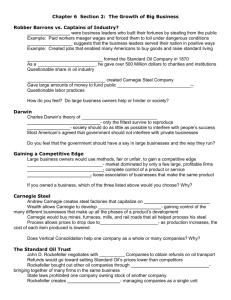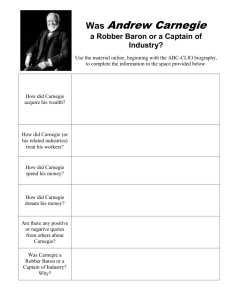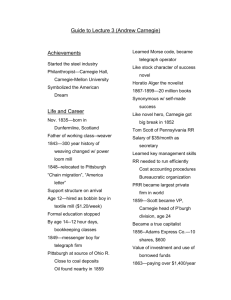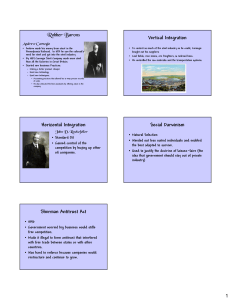TAKS Remediation Lesson #1
advertisement
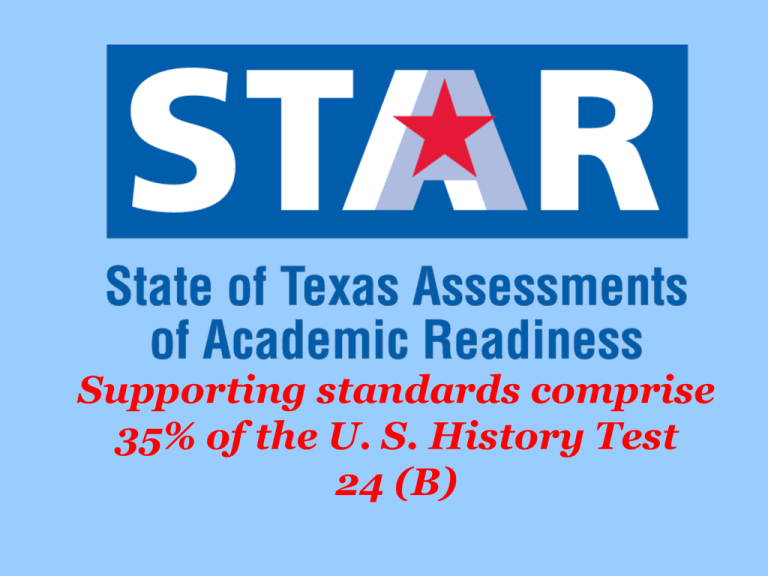
Supporting standards comprise 35% of the U. S. History Test 24 (B) Supporting Standard (24) The student understands the importance of effective leadership in a constitutional republic. The Student is expected to: (B) Evaluate the contributions of significant political leaders in the U. S. such as Andrew Carnegie, Thurgood Marshall, Billy Graham, Barry Goldwater, Sandra Day O’Connor, & Hillary Clinton Supporting Standard (24) The student understands the importance of effective leadership in a constitutional republic. The Student is expected to: (B) 1 Evaluate the contributions of significant political leaders in the U. S. such as Andrew Carnegie Who was Andrew Carnegie? Andrew Carnegie (1835–1919) was a Scottish-American industrialist who led the enormous expansion of the American steel industry in the late-19th century. He was also one of the highest profile philanthropists of his era; his 1889 article proclaiming The Gospel of Wealth called on the rich to use their wealth to improve society, and stimulated wave after wave of philanthropy. Carnegie was born in Dunfermline, Scotland, and immigrated to the United States with his very poor parents in 1848. In a rags to riches story, Carnegie started as a telegrapher and by the 1860s had investments in railroads, railroad sleeping cars, bridges and oil derricks. He built further wealth as a bond salesman raising money for American enterprise in Europe. He built Pittsburgh's Carnegie Steel Company, which he sold to banker J. P. Morgan in 1901 for $480 million (the equivalent of approximately $13.5 billion in 2013), creating the U. S. Steel Corporation. Vertical Integration—New form of Organization Carnegie realized fortunes of his steel plant depended on forces outside his own control, e.g., mining companies, ships and rail lines for transport, so he bought these entities. Andrew Carnegie and Steel Industry (1835-1919) “Andrew Carnegie emerged as the undisputed master of the [steel] industry.” He insured control of process from securing raw material through turning it into the finished product. He believed in value of competition, free enterprise—he opposed trusts since they violated laws of competition Management vs. Labor Suspicion and Distrust Existed on Both Sides • Management’s position—Unions interfered with management’s right to bargain with individuals Carnegie’s Homestead Steel Plant Strike Smoke rising from the Homestead Steel Plant Above left, plant manager Henry Clay Frick (1849-1919) and above to the right, plant owner Andrew Carnegie The Philosophy of Laissez-faire • Carnegie’s “Gospel of Wealth” • Defended accumulation of wealth • Asserted responsibility of wealthy to spend properly • Act as “trustee” for poorer brethren • Donate money to worthy causes Carnegie Philanthropy Among other things: • At age 65, sold Carnegie Steel for $480 million & devoted remainder of his life to philanthropic activities • Gave away over $350 million, centering most around education & world peace • Spent over $56 million to build 2,509 libraries throughout the English-speaking world • Founded 13 different trusts including: Carnegie devoted 1901-1919 to large-scale philanthropy, with special emphasis on local libraries, world peace, education and scientific research. • Carnegie Foundation • Carnegie Library & Museum of Pittsburgh • Carnegie Mellon University • Carnegie Corporation of New York Carnegie & the SpanishAmerican War Carnegie so objected to the annexation of the Philippines that he actually offered to purchase Filipino independence for no less than $20— the very price the U.S. government paid to Spain for the annexation of the area. Supporting Standard (24) The student understands the importance of effective leadership in a constitutional republic. The Student is expected to: (B) 2 Evaluate the contributions of significant political leaders in the U. S. such as Thurgood Marshall Thurgood Marshall (1908-1993) was an Associate Justice of the U. S. Supreme Court, nominated by President Lyndon Johnson & serving from October 1967 until October 1991. Marshall was the Court's 96th justice and its first African-America justice. He served on the U. S. Court of Appeals for the Second Circuit after being appointed by President John Kennedy and then served as the Solicitor General after being appointed by President Johnson in 1965. At the age of 32, Marshall won U. S. Supreme Court case, Chambers v. Florida. That same year, he founded and became the executive director of the NAACP Legal Defense & Educational Fund. Before becoming a judge, Marshall was a lawyer who was best known for his high success rate in arguing before the Supreme Court and for the victory in Brown v. Board of Education, a decision that desegregated public schools. His most famous case as a lawyer was Brown v. Board of Education of Topeka, the case in which the Supreme Court ruled that “separate but equal” public education, as established by Plessy v. Ferguson, was not applicable to public education because it could never be truly equal. In total, Marshall won 29 out of the 32 cases he argued before the Supreme Court. On June 13, 1967, President Johnson nominated Marshall to the Supreme Court following the retirement of Justice Tom C. Clark, saying that this was "the right thing to do, the right time to do it, the right man and the right place." Marshall served on the Court for the next 24 years, compiling a liberal record that included strong support for Constitutional protection of individual rights, especially the rights of criminal suspects against the government. Left, in 1967, Marshall in the Oval Office, and above, Marshall linked with company of the most praiseworthy sort: Nelson Mandela, Frederick Douglass, & Harriet Tubman Supporting Standard (24) The student understands the importance of effective leadership in a constitutional republic. The Student is expected to: (B) 3 Evaluate the contributions of significant political leaders in the U. S. such as Billy Graham William Franklin “Billy” Graham, Jr. (b. 1918) is an American evangelical Christian evangelist, ordained as a Southern Baptist minister, who rose to celebrity status in 1949 reaching a core constituency of white, middle-class, moderately conservative Protestants. He held large indoor and outdoor rallies; sermons were broadcast on radio and television, some still being re-broadcast today. Graham was a spiritual adviser to several Presidents; he was particularly close to Eisenhower, Johnson (who was considered to be one of Graham's closest friends) and Nixon. During the civil rights movement, he began to support integrated seating for his revivals and crusades; in 1957 he invited Martin Luther King, Jr. to preach jointly at a revival in New York City. Graham bailed King out of jail in the 1960s when he was arrested in demonstrations. Supporting Standard (24) The student understands the importance of effective leadership in a constitutional republic. Graham operates a variety of media and publishing outlets. According to his staff, more than 3.2 million people have responded to the invitation at Billy Graham Crusades to “accept Jesus Christ as their personal savior.” As of 2008, Graham's estimated lifetime audience, including radio and television broadcasts, topped 2.2 billion. Graham has repeatedly been on Gallup’s list of most admired men & women. He has appeared on the list 55 times since 1955 (including 49 consecutive years), more than any other individual in the world. Grant Wacker reports: “By the middle 1960s, he had become the ‘Great Legitimator.’ . . . His presence conferred sanctity on events, authority on presidents, acceptability on wars, desirability on decency, [and] shame on indecency....By the middle 1970s, many deemed him ‘America’s pastor.’” Graham remains probably the most recognizable & respected religious figure in America. Supporting Standard (24) The student understands the importance of effective leadership in a constitutional republic. The Student is expected to: (B) 4 Evaluate the contributions of significant political leaders in the U. S. such as Barry Goldwater Barry Morris Goldwater (1909–1998) was a businessman and fiveterm U. S. Senator from Arizona (1953–65, 1969–87) & the Republican Party’s nominee for president in the 1964 election against incumbent Lyndon Johnson. An articulate and charismatic figure during the first half of the 1960s, he was known as “Mr. Conservative.” Goldwater is the politician most often credited for sparking the resurgence of the American conservative political movement in the 1960s. He also had a substantial impact on the libertarian movement. Goldwater rejected the legacy of the New Deal and fought through the conservative coalition against the “New Deal coalition.” Goldwater mobilized a large conservative constituency to win the hard-fought Republican primaries. Goldwater's conservative campaign platform ultimately failed to gain the support of the electorate and he lost the 1964 election by one of the largest landslides in history, bringing down many Republican candidates as well. The Johnson campaign and other critics painted him as a reactionary, while supporters praised his crusades against the Soviet Union, labor unions, & the welfare state. His defeat with the defeat of so many older Republicans in 1964 cleared the way for a younger generation of American conservatives to mobilize. Goldwater returned to the Senate in 1969, and specialized in defense policy, bringing to the table his experience as a senior officer in the Air Force Reserve. In 1974, as an elder statesman of the party, Goldwater successfully urged President Nixon to resign when evidence of a cover-up in the Watergate scandal became overwhelming and impeachment was imminent. Supporting Standard (24) The student understands the importance of effective leadership in a constitutional republic. The Student is expected to: (B) 5 Evaluate the contributions of significant political leaders in the U. S. such as Sandra Day O’Connor Sandra Day O’Connor (b. 1930) is a retired U. S. Supreme Court justice, and in 2013 was listed as a NAFTA adjudicator. She served as an Associate Justice from her appointment in 1981 by President Reagan until her retirement from the Court in 2006. She was the first woman to be appointed to the Court. Prior to O’Connor’s appointment to the Court, she was an elected official and judge in Arizona serving as the first female Majority Leader in the United States as the Republican leader in the Arizona Senate. Considered a federalist and a moderate conservative, O’Connor tended to approach each case narrowly without arguing for sweeping precedents. Her unanimous confirmation by the Senate in 1981 was She most frequently sided supported by most with the court’s conservative bloc, although conservatives, led by Arizona Senator Barry Goldwater, and in the latter years of her liberals, including tenure, she was regarded as Massachusetts Senator Ted Kennedy and women's rights having the swing vote in groups like the National many cases. Organization for Women. Several publications Sandra Day O’Connor. have named O’Connor among the most powerful women in the world. On August 12, 2009, she was awarded the Presidential Medal of Freedom, the highest civilian honor of the United States, by President Obama. Supporting Standard (24) The student understands the importance of effective leadership in a constitutional republic. The Student is expected to: (B) 6 Evaluate the contributions of significant political leaders in the U. S. such as Hillary Clinton ? Hillary Diane Rodham Clinton (b. 1947) is a former U. S. Secretary of State, U. S. Senator, & First Lady of the U. S. From 2009 to 2013, she was the 67th Secretary of State, serving under President Obama. She previously represented New York in the U. S. Senate (2001 to 2009). Before that, as the wife of President Bill Clinton, she was First Lady from 1993 to 2001. In the 2008 election, Clinton was a leading candidate for the Democratic presidential nomination. A native of Illinois, Hillary Rodham was the first student commencement speaker at Wellesley College in 1969. She then earned a J. D. from Yale School of Law in 1973. While practicing law in the 1970s, she was twice listed her as one of the hundred most influential lawyers in America. As First Lady of Arkansas from 1979 to 1981 and 1983 to 1992 with husband Bill as Governor, she led a task force that reformed Arkansas’s education system. In 1994, as First Lady of the United States, her major initiative, the Clinton health care plan, failed to gain approval from the U.S. Congress. In 2000, Hillary Clinton is the only First Lady ever to have run for public office. Clinton was reelected to the Senate in 2006. In 2008, Hillary Clinton won far more primaries and delegates than any other female candidate in American history, but narrowly lost the nomination to U. S. Senator from Illinois, Barack Obama. Obama nominated Clinton to be Secretary of State, and she was confirmed by the Senate in January 2009. Secretary of State Clinton with Pakistan’s Prime As Secretary of State, she visited more countries than anyMinister other Secretary of State. encouraged empowerment women Yousuf Raza Gilani in Islamabad duringofClinton's everywhere, and used socialPakistan media to communicate the U.S. message trip abroad. Fini

